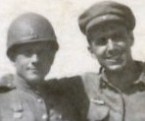tsbond,
About the United States of America, I'm glad you feel so happy about the country we live in. I honestly wish I could feel the same way. Enough said from this corner regarding that subject.
As for books on the Soviet Union, I think most people can vouch for the fact that this totalitarian regime had both horrendous work camps for anyone deemed 'unworthy', as well as a dictator whos cruelty was only exceeded by his paranoia. However, what people are not so aware of is the degree to which Russians were willing to die for their homeland, and even more importantly, the actual skill and focus that the Red Army systematically developed in order to defeat Germany. Good books on this are:
- War in Russia, A.Werth - excellent read on both the big and small stories of the Soviet Union's war with Germany. This book does a terrific job at conveying what it meant to be a Soviet during this time. Written by a BBC journalist who lived in Moscow during this period.
- When Titans Clashed, Col.D.Glantz - A comprehensive overview of the War in Russia, but from the Soviet perspective. Written with the help of both Soviet and German archives to better ascertain the truth of the war's conduct. Glatnz is one of the foremost historians on Soviet military studies, and like Erickson, speaks fluent Russian, a rare trait among western historian in this area.
There are also several series of books available through
Frank Cass Pub. that are edited by Col.Glantz that cover the more theoretical and technical aspects of the Soviet art of war in WWII. These are definite eye-openers.
Finally, here is a quote from the book,
Why the Allies Won by Richard Overy (he also wrote
Russia's War, the book that became the catalyst for the PBS series of same name, though strangely the TV series was somewhat different from the book):
The law of the jungle might have assisted German fighting spirit in the Soviet campaign, but its moral effects were otherwise entirely negative. The criminalization of warfare produced a growing indiscipline and demoralization among German forces themselves. The German army shot fifteen thousand of their own number, the equivalence of a whole division. A further 23,000 were sentenced to long prison terms, and another 404,000 to shorter periods in prison or penal battalions. As a proportion of total mobilized manpower, these figures were higher than they were for the Red Army, 3.3 per cent against an estimated 1.25 per cent. Desertion or refusal to obey orders increased as the war went on, and the law of the jungle seeped into the military structure itself. The struggle for survival had a remorseless logic. The regime imposed ever more draconian terror on its own forces to keep them fighting until the very end of the war when Hitler, amidst the dying embers of his Reich, ordered any saboteur or deserter shot on the spot.
------------------
Best regards,
Greg Leon Guerrero






